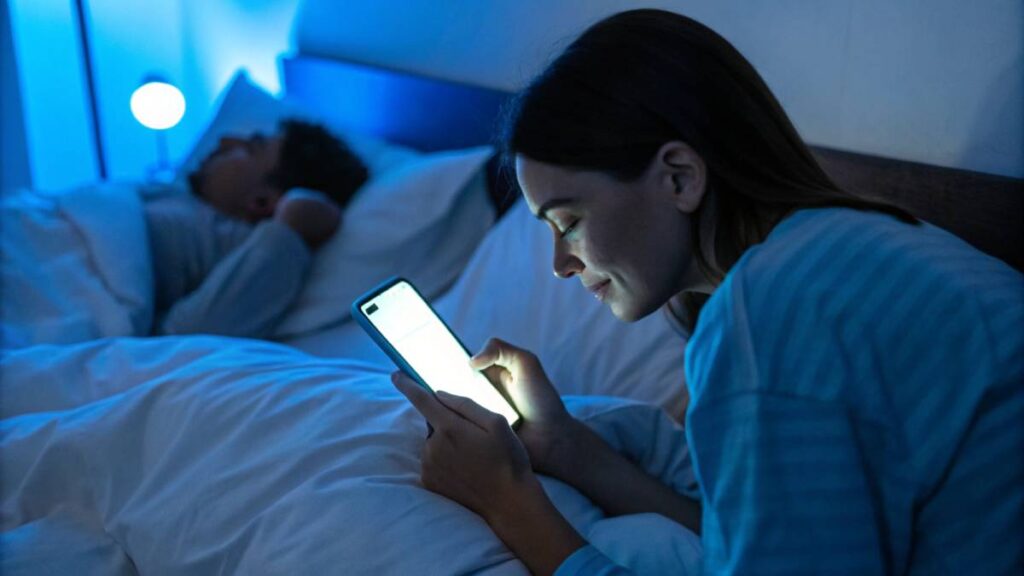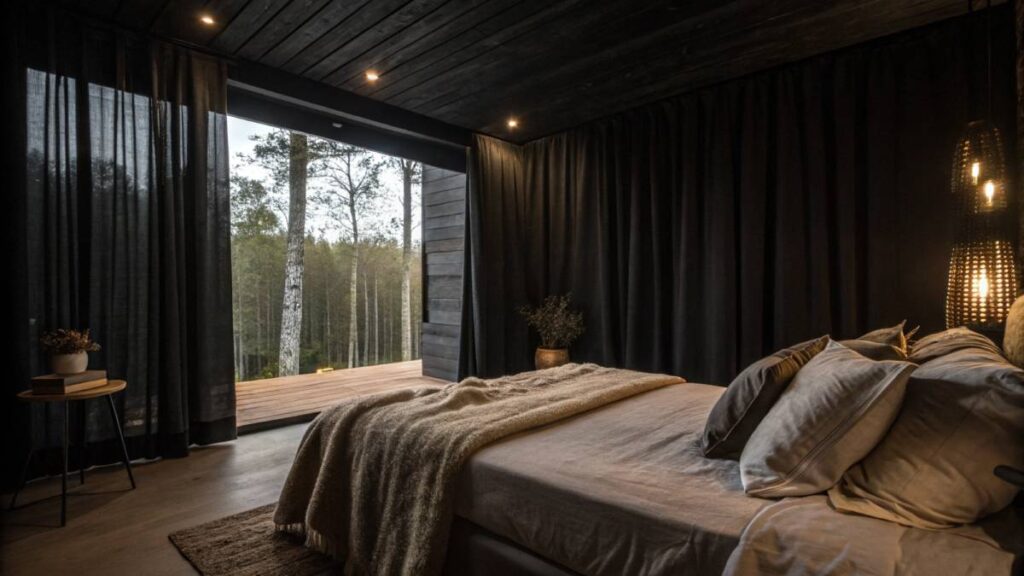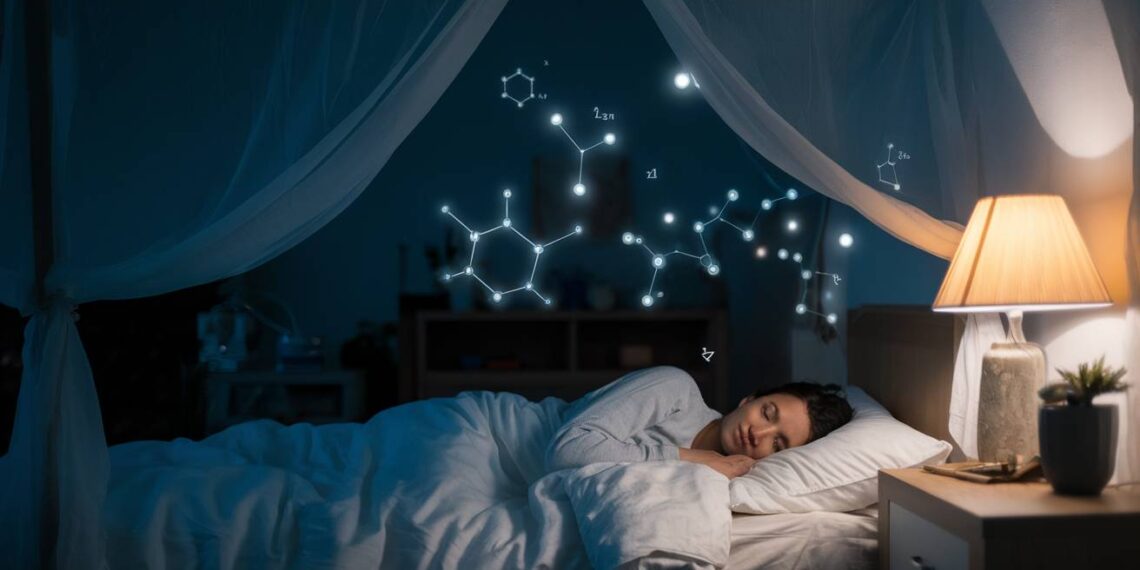Struggling to catch those elusive Zzz’s? You’re not alone. In today’s fast-paced world, achieving quality sleep can feel like an impossible feat. Enter melatonin—a natural hormone that could be your ticket to better rest. From regulating your internal clock to enhancing sleep quality, melatonin offers a myriad of benefits. But how does it work, and is it right for you? Dive into our comprehensive guide to uncover how melatonin, combined with simple lifestyle tweaks, can transform your nighttime routine and help you wake up refreshed and energized.
Key Takeaways
- Melatonin Regulation: Understand how melatonin levels fluctuate throughout the day and their impact on sleep.
- Supplement Benefits: Discover how melatonin supplements can aid in quicker sleep onset, improve sleep quality, and combat jet lag.
- Potential Risks: Be aware of side effects and interactions with medications when considering melatonin supplementation.
- Natural Sources: Learn about foods rich in melatonin and lifestyle choices that enhance its production.
- Sleep Hygiene: Implement effective sleep hygiene practices to maximize melatonin’s benefits and ensure restful nights.
Understanding Melatonin
Melatonin plays a big part in how we wind down and wake up every day. To really make the most of melatonin for catching those Zs, you’ve got to get what it is and how it shakes up your sleep routine.
What is Melatonin?
Think of melatonin as your night signal. This hormone gets cranked out by a tiny gland in your noggin called the pineal gland. As the sun sets and evening comes, melatonin steps up, giving your body the nudge that it’s time to hit snooze.
“Sleep is the golden chain that ties health and our bodies together.” — Thomas Dekker
Bits and bobs about melatonin:
- Type: Hormone that whispers “it’s bedtime”
- Where it comes from: Little gizmo in your brain called the pineal gland
- When it’s made: Mostly at night, when it’s dark
- Job: Tells your body to settle in for some relaxation
| Time of Day | Melatonin Levels (pg/mL) |
|---|---|
| Morning (7 AM) | 10-20 |
| Noon (12 PM) | <10 |
| Evening (7 PM) | 50-100 |
| Night (12 AM) | 100-200 |
By getting a grip on melatonin’s role, folks can figure out more natural ways to nod off. Want more tips on drifting into dreamland? Check out our guide on natural sleep solutions.

How Melatonin Affects Sleep
Melatonin works behind the scenes in your brain, helping you hit the hay faster and sleep better. When levels of melatonin rise, it’s like your body’s “Chill out, it’s bedtime” alarm goes off, making you feel pleasantly sleepy and ready to crash for the night.
Melatonin on your snooze:
- Gets You Snoozing: Makes falling asleep a breeze
- Boosts Sleep Quality: Helps you sleep deeper
- Sets the Body Clock: Pins down your sleep and wake times
For melatonin to do its best work, stick to a regular sleep routine and create a cozy place to catch some shut-eye. Want to know how to make your bedroom a sleep paradise? Take a peek at our tips on a sleep-friendly bedroom.
Stuff that changes melatonin making:
- Light: Bright lights, especially blue lights from gadgets, tell your body to dial back on melatonin. Dive into more on screen time’s effects in our piece on digital detox sleep benefits.
- Growing Older: As you age, melatonin’s production slows, meaning sleep might change for grandpa and grandma.
- Lifestyle Choices: Messy sleep patterns and stress knock melatonin levels out of whack.
| Influencing Factor | How it Affects Melatonin |
|---|---|
| Light Exposure | Drops Melatonin |
| Night’s Darkness | Pumps Up Melatonin |
| Aging | Melatonin Shrinks |
| Keeping Bedtime Fixed | Boosts Melatonin |
| Stress | Lowers Melatonin |
When you get how melatonin ticks, it’s easier to make choices that lead to better nights. If sleep’s not coming easy due to our own habits or the world around us, honing in on melatonin could help. Need more on tackling sleepy-time troubles naturally? Find our scoop on best natural sleep aids.
Natural Sources of Melatonin
For anyone desperate for a good snooze, knowing where to find melatonin is like discovering the holy grail of sleep. This section is your golden ticket to learn how to get melatonin from what you eat and why catching some rays is more than just a chance to work on your tan.

Foods Rich in Melatonin
If you want to snooze better, toss some melatonin-rich munchies into your meal plan. It’s like fast-tracking your way to a dreamland passport. Certain fruits, veggies, and even some animal-based goodies have surprising amounts of this sleep hormone. Here’s your go-to grocery list:
| Food | Melatonin (ng per gram) |
|---|---|
| Tart Cherries | 15.8 |
| Goji Berries | 3.4 |
| Eggs | 1.1 |
| Milk | 1.0 |
| Fish | 0.9 |
If you’re curious about how your diet does more than fill your belly, swing by our write-up on foods for better sleep.
Importance of Sunlight Exposure for Melatonin Production
Sunshine isn’t just about vitamin D, folks. It’s a key player in your body’s tag team with melatonin. Natural light tells your internal clock it’s showtime for wakefulness. Then, as the sun sets, your body kicks melatonin production into high gear, readying you for dreamland.
If you’re the insomniac next door, working graveyard shifts, or just want to swap pills for natural fixes, sunbathing smartly might be your ticket to dreamland city. Check out what different times of day mean for your melatonin levels:
| Time of Day | Melatonin Levels |
|---|---|
| Morning (8 AM – 12 PM) | Low |
| Afternoon (12 PM – 5 PM) | Low |
| Evening (5 PM – 9 PM) | Increasing |
| Night (9 PM – 6 AM) | High |
For slick ways to let sunshine guide your sleep, don’t miss our piece on resetting the circadian rhythm.
Mixing in these natural sources of melatonin might just dial up your sleep quality to pro-level. For more nifty tips on catching more z’s, check out our guides on how to fall asleep naturally and best natural sleep aids.
Melatonin Supplements
Benefits of Melatonin Supplements
Melatonin’s like nature’s sleep whisperer, known to give your snooze a little nudge in the right direction. Here’s what it can do for you:
- Quicker to Dreamland: If counting sheep isn’t cutting it, melatonin might help you hit the hay faster.
- Better Shut-eye: It could mean fewer middle-of-the-night wake-up calls, giving you a smoother night’s rest.
- Reset Your Sleep Rhythm: Got a wacky sleep routine from working night shifts? This could help sync your body clock to reality.
- Beating Jet Lag: Traveling across time zones can throw off your ZZZs, but melatonin can help get you back on track with local time.
Benefits Chart
| Benefit | Description |
|---|---|
| Quicker to Dreamland | Fall asleep faster |
| Better Shut-eye | Improved sleep |
| Reset Your Sleep Rhythm | Balance sleep schedule |
| Beating Jet Lag | Adjust to new zones |
Thinking of tossing the sleeping pills? Melatonin’s your natural go-to. Want more tips on getting natural rest? Check out the article on best natural sleep aids.

Risks and Considerations
Melatonin’s got its perks, but there’s a flip side to every coin. Here’s what you should keep an eye on:
- Feeling Funky: Some folks might feel dizzy, get headaches, or be groggy when the sun’s up.
- Mixing It Up with Meds: It could tango with meds like blood thinners or diabetes treatments, so keep your doc in the loop.
- Less is More: Going ham on the dosage can flip your sleep cycle upside down or mess with your day.
- Long Haul Concerns: We don’t fully know what long-term use might bring, so it’s best to keep your doc close.
Risks and Considerations Chart
| Risk | Description |
|---|---|
| Feeling Funky | Dizziness, headaches, daytime grogginess |
| Mixing It Up with Meds | Caution with blood thinners, diabetes meds |
| Less is More | Too much can lead to opposite effects |
| Long Haul Concerns | Professional guidance suggested |
Thinking about grabbing melatonin? A quick chat with your healthcare provider is a good move, especially if you’re juggling other meds. Need more advice on natural sleep fixes? Check out the article on natural sleep solutions.
For more info:
- stress and sleep solutions
- exercise for better sleep
- bedtime routine for adults
- digital detox sleep benefits
Melatonin for Specific Groups
Children and Melatonin
Kids sometimes toss and turn through the night, and melatonin might give them a nudge towards dreamland. But don’t just toss those gummies at them – you gotta handle it right. This ain’t candy, folks. Parents should always loop in a doctor for the best dosage and schedule when thinking about melatonin for their little ones.
| Age Group | Melatonin Dose (mg) |
|---|---|
| 3-5 years | 1-2 mg |
| 6-12 years | 2-3 mg |
| Teenagers | 3-5 mg |
Little ones dealing with ADHD or autism might find melatonin helps them rest a bit easier. It’s also a handy trick for those jumpy sleep patterns from things like jet lag or wacky bedtimes. Thinking about more ways to get those kiddos snoozing? Check out our piece on how to fall asleep naturally.
Older Adults and Melatonin
As folks hit the golden years, their internal clocks can get a bit out of whack. It’s tougher to get and stay asleep, making melatonin a potential friend in the sleep game. That said, granny and gramps should kick things off with the smallest dose to dodge any unwelcome surprises.
| Age Group | Melatonin Dose (mg) |
|---|---|
| 60+ years | 0.5-2 mg |
Melatonin might help with the whole falling asleep ordeal by syncing up those internal rhythms with bedtime. And who doesn’t want that sweet, sweet sleep quality boost? Joining forces with sleep-friendly bedroom habits and trying some best natural sleep aids might just do the trick.
Shift Workers and Melatonin
Shift workers – we see you with that topsy-turvy sleep schedule. Since work hours like to brawl with natural rhythms, melatonin can offer some solid help.
| Work Schedule | Melatonin Dose (mg) |
|---|---|
| Night Shift | 0.5-3 mg |
| Rotating Shifts | 1-3 mg |
For those riding the night train, taking melatonin about an hour before bed can help shout to your body that it’s bedtime. Mix melatonin with a solid sleep routine and a comfy sleep nook, and you’re onto something good. Want more clever sleep hacks? Dive into our guide on reset circadian rhythm.
By having a handle on what different groups need for sleep, people can tweak their melatonin game to sleep peacefully. Got a hankering for more sleep tips and tricks? Swing by our article on atural sleep solutions for the full scoop.
Regulating Melatonin Production
If you wanna make the most of melatonin for catching quality Zzz’s, it’s all about letting your body do its thing naturally. This boils down to sticking to some smart sleep habits and giving those screens a rest before hitting the hay.
Sleep Hygiene Practices
Think of sleep hygiene like your personal bedtime toolkit. It’s about setting yourself up for a solid night of snooze through a handful of nifty habits and routines.
Tips for Better Sleep:
- Stick to a Routine: Go to bed and rise like clockwork, even if it’s Saturday night or Sunday morning.
- Unwind Your Mind: Chill out before bed with a good book, mellow tunes, or a cozy bath.
- Tweak Your Bedroom: Keep it cool, dark, and quiet. Blackout curtains or a noise machine might just be your best friends.
- Keep Naps Short: Long daytime naps can mess with your nighttime slumber. Try to keep ’em short or skip them altogether.
- Watch What You Eat and Drink: Skip heavy meals, caffeine, and alcohol as you wind down. Curious about sleep-friendly foods? Check out our article on foods for better sleep.

Reducing Screen Time Before Bed
Too much screen action before calling it a night can throw a wrench in your body’s melatonin-making magic. Gadgets like phones, tablets, and computers blast out blue light, which ticks off your body’s internal clock and might keep you tossing and turning.
Screen Time Slashing Strategies:
- Set a Gadget Bedtime: Power down those devices a good hour before you plan to sleep.
- Cut Blue Light: If you have to stare at a screen, grab some blue light glasses or change your device settings to night mode.
- Go Old School: Swap screen time for old-school activities like reading a paper book, jotting down thoughts, or picking up a chill hobby.
- Get Everyone on Board: Let everyone at home know how screens mess with sleep, and get the whole gang to play ball.
For more on ditching screens for better sleep, peek at our article on digital detox sleep benefits.
By getting into these sleep habits and dialing down the screen time, you can boost your natural melatonin groove and snag a night full of sweet, uninterrupted dreams.
Combining Melatonin with Other Sleep Tricks
Mixing melatonin with some good ol’ natural sleep tricks is like adding whipped cream to your sundae—it just makes the whole thing better! If you’re fighting insomnia, stress-fueled sleepless nights, or just struggling to keep a regular sleep schedule, teaming melatonin with other sleep aids can make a real difference.
The best bridge between despair and hope is a good night’s sleep.” — E. Joseph Cossman
Chill Out with Relaxation Routines
To snooze like a baby, winding down is key. Use these chill-out techniques with melatonin for a knockout combo:
- Meditation: Give meditation for sleep a try to help your mind kick back and curb any jitters before bed.
- Breathing Exercises: Deep breaths can usher your nervous system into relax mode, prepping you for Zzz’s.
- Yoga: Easy-peasy yoga moves, like the ones in our yoga poses for sleep, can get those muscles loose and ready for rest.
| Relaxation Routine | Perks |
|---|---|
| Meditation | Wipes out anxiety, clears the noggin |
| Breathing Exercises | Chills the nervous system |
| Yoga | Unwinds muscles, stretches out kinks |
Setting Up This Snooze-Haven
To really let melatonin work its magic, your bedroom needs to be a sleep trap:
- Temperature Control: Keep it chilly for a comfy snooze.
- Lighting: Go for dim lights or blackout curtains to amp up that melatonin production and set the scene for relaxation.
- Comfy Bedding: The best mattress for sleep and snuggly sheets can totally up your sleep game.
- Aromatherapy: Whip out those essential oils for sleep like lavender or chamomile to turn the bedroom into a spa.
Wanna know more about making your space sleep-friendly? Check out our sleep-friendly bedroom guide.
By blending melatonin with these chill routines and setting the perfect bedroom vibe, you’re on the highway to better sleep. Mixing and matching different tricks could lead you to your dream sleep setup. For more sleepy-time inspo, take a look at our articles on best natural sleep aids, herbal teas for sleep, and diet for better sleep.

Main Tips
- Maintain a Regular Sleep Schedule: Go to bed and wake up at the same time every day to regulate your body’s internal clock.
- Limit Screen Time Before Bed: Reduce exposure to blue light from devices at least an hour before bedtime.
- Create a Relaxing Bedtime Routine: Incorporate activities like reading or taking a warm bath to signal your body it’s time to sleep.
- Optimize Your Sleep Environment: Keep your bedroom cool, dark, and quiet to enhance melatonin production.
- Consult a Healthcare Provider: Before starting melatonin supplements, especially if you’re taking other medications.
Final Thoughts
Harnessing the benefits of melatonin can be a game-changer for your sleep quality and overall health. While supplements offer a convenient boost, integrating natural sources and maintaining good sleep hygiene are equally important. Remember, everyone’s body responds differently, so it’s crucial to find the right balance that works for you. Prioritize a consistent sleep schedule, create a restful environment, and consult with healthcare professionals when considering melatonin supplements. With these strategies in place, you’re well on your way to achieving the restful and rejuvenating sleep you deserve.
Conclusion
Achieving restful sleep is a cornerstone of overall well-being, and melatonin plays a pivotal role in this intricate process. By understanding how melatonin levels fluctuate and leveraging supplements wisely, you can navigate sleep challenges with greater ease. However, it’s essential to approach melatonin use thoughtfully, considering potential risks and consulting healthcare professionals when necessary. Coupled with natural sleep aids like aromatherapy, proper sleep hygiene, and mindful lifestyle choices, melatonin can significantly enhance your sleep quality. Whether you’re a shift worker battling irregular hours or someone seeking to improve nightly rest, integrating melatonin into your routine offers a promising pathway to better sleep. Embrace these strategies to unlock the full potential of melatonin and wake up revitalized every morning.
FAQs
What is melatonin and how does it work?
Melatonin is a natural hormone produced by the pineal gland in your brain. It regulates your sleep-wake cycle by signaling to your body when it’s time to sleep.
Can melatonin supplements help with insomnia?
Yes, melatonin supplements can help reduce the time it takes to fall asleep and improve overall sleep quality for those struggling with insomnia.
Are there any side effects of taking melatonin?
Some individuals may experience dizziness, headaches, or daytime grogginess. It’s important to consult a healthcare provider before starting melatonin, especially if you’re on other medications.
What are the best natural sources of melatonin?
Foods like tart cherries, goji berries, eggs, milk, and fish are rich in melatonin. Incorporating these into your diet can help boost your natural melatonin levels.
How does screen time affect melatonin production?
Exposure to blue light from screens can inhibit melatonin production, making it harder to fall asleep. Reducing screen time before bed can enhance melatonin’s effectiveness.






